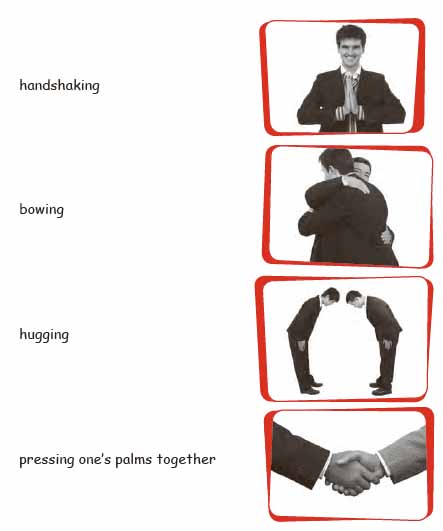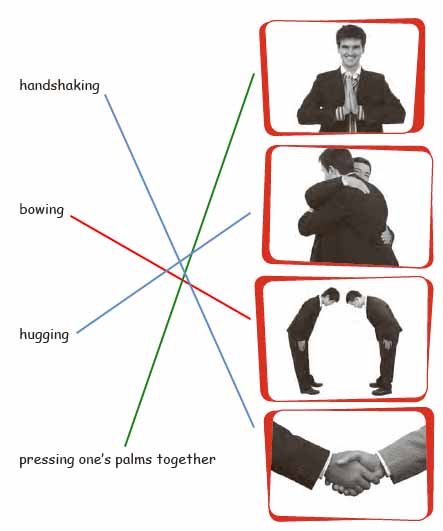جواب فصل 3 Art and Culture کتاب کار انگلیسی یازدهم
تعداد بازدید : 3.13Mپاسخ به تمامی سوالات فصل Art and Culture - حل المسائل فصل 3 Art and Culture - گام به گام 1401 کتاب کتاب کار انگلیسی یازدهم - گام به گام کتاب کتاب کار انگلیسی یازدهم مطابق با آخرین تغییرات کتب درسی
Get ready صفحه 44 درس Art and Culture کتاب کار انگلیسی یازدهم
پاسخ Get ready صفحه 44 درس 3
جواب Get ready صفحه 44 درس 3 کتاب کار انگلیسی یازدهم
A. People greet each other differently around the world. In the following, you can see some ways of greeting. Now, match the pictures with their greeting actions.

B. Where can you see these greeting actions?
A.

B.
Handshaking : Europe
Bowing : East of Asia
Hugging : Middle East
Pressing one’s palms together : India and …
الف) مردم در سراسر جهان به حالت های مختلف احوالپرسی می کنند. در زیر شما می توانید بعضی از حالت های احوال پرسی را ببینید. اکنون تصاویر را با حالت های احوالپرسی منطبق کنید.
ب) کجا می توانید این حالت های احوالپرسی را ببینید؟
دست دادن : قاره اروپا
خم شدن : شرق آسیا
بغل کردن: خاورمیانه
دو کف دست را به هم فشردن: هند و ...
مای درس ، برترین اپلیکیشن کمک درسی ایران
پوشش تمام محتواهای درسی پایه یازدهم- آزمون آنلاین تمامی دروس پایه یازدهم
- گام به گام تمامی دروس پایه یازدهم
- ویدئو های آموزشی تمامی دروس پایه یازدهم
- گنجینه ای از جزوات و نمونه سوالات تمامی دروس پایه یازدهم
- فلش کارت های آماده دروس پایه یازدهم
- گنجینه ای جامع از انشاء های آماده پایه یازدهم
- آموزش جامع آرایه های ادبی، دستور زبان، قواعد زبان انگلیسی و ... ویژه پایه یازدهم
PART I Reading Comprehension صفحه 46 درس Art and Culture کتاب کار انگلیسی یازدهم
پاسخ PART I Reading Comprehension صفحه 46 درس 3
جواب PART I Reading Comprehension صفحه 46 درس 3 کتاب کار انگلیسی یازدهم
Cultures and Lifestyles
Culture is a system of shared beliefs that are common in a society. Often, we think of the food, music, clothing, and holidays that are common in a society as its culture, but these are only some of the elements. Other elements include customs, values, behaviors, and artifacts. Culture is, therefore, a combination of thoughts, feelings, attitudes, and beliefs.
With more than 190 countries and 7 billion people on earth, it is not hard to imagine that many cultures exist. No matter where you go around the world, you will face people, lifestyles and cultures that are different to what you have. People around the world have very different lives and ways of living. They have different beliefs and customs. So they usually live and behave according to what they believe to be right and wrong.
Learning to respect other cultures is important for having new experiences and learning about the world. One of the first steps to learn about other cultures is to simply accept that there are many different cultures exist other than our own culture. One of the most important ways to learn to become respectful of other cultures is to spend some time reflecting on our own. Then it is important to understand something about other cultures.
For those who want to learn about other cultures, but do not know where to start, a great place to start is reading about the cultures that interest them. In today’s world if we all are able to know about other cultures, and respect them, life would be easier for most of us.
A. True or False
1. Culture is only a combination of food, clothing and holidays. T F
2. Different people of the world may have different cultures and lifestyles. T F
3. Respecting other cultures often makes our lives easier. T F
B. Scan the ‘text’ to find the following information.
1. How many countries are there in the world?
2. What are the elements of culture?
3. How can we start learning about other cultures?
C. Find what these words refer to.
1. its (paragraph 1): …………………………… .
2. they (paragraph 2): ……………………………… .
3. them (paragraph 4): ……………………………… .
Cultures and Lifestyles
Culture is a system of shared beliefs that are common in a society. Often, we think of the food, music, clothing, and holidays that are common in a society as its culture, but these are only some of the elements. Other elements include customs, values, behaviors, and artifacts. Culture is, therefore, a combination of thoughts, feelings, attitudes, and beliefs.
With more than 190 countries and 7 billion people on earth, it is not hard to imagine that many cultures exist. No matter where you go around the world, you will face people, lifestyles and cultures that are different to what you have. People around the world have very different lives and ways of living. They have different beliefs and customs. So they usually live and behave according to what they believe to be right and wrong.
Learning to respect other cultures is important for having new experiences and learning about the world. One of the first steps to learn about other cultures is to simply accept that there are many different cultures exist other than our own culture. One of the most important ways to learn to become respectful of other cultures is to spend some time reflecting on our own. Then it is important to understand something about other cultures.
For those who want to learn about other cultures, but do not know where to start, a great place to start is reading about the cultures that interest them. In today’s world if we all are able to know about other cultures, and respect them, life would be easier for most of us.
A.
1. Culture is only a combination of food, clothing and holidays. False
2. Different people of the world may have different cultures and lifestyles. True
3. Respecting other cultures often makes our lives easier. True
B.
1. How many countries are there in the world?
More than 190 countries.
2. What are the elements of culture?
Food, music, clothing, holidays, customs, values, behaviors, and artifacts.
3. How can we start learning about other cultures?
A great place to start is reading about the cultures that interest them.
C.
1. its (paragraph 1): society
2. they (paragraph 2): people
3. them (paragraph 4): those
فرهنگ ها و سبک های زندگی
فرهنگ سیستمی از عقاید به اشتراک گذاشته شده است که در یک جامعه رایج هستند. بارها، ما به غذا، موسیقی، پوشش و مراسم هایی که در یک جامعه هستند به عنوان فرهنگش فکر می کنیم اما این ها فقط بعضی از قسمت ها هستند. قسمت های دیگر شامل سنت ها، ارزش ها رفتارها و اثرات تصنعی هستند. برای همین فرهنگ ترکیبی از افکار، عواطف، نگرش ها و عقاید است.
با بیش از ۱۹۰ کشور و ۷ میلیارد انسان روی زمین، تصور اینکه فرهنگ های بسیاری وجود دارد سخت نیست. مهم نیست کجای دنیا میروید، با افراد، سبک های زندگی و سنتهایی روبه رو می شوید که با آنچه دارید متفاوت است. افراد در سراسر جهان زندگی ها و سبک زندگی های خیلی متفاوتی دارند. آنها عقاید و سنتهای متفاوتی دارند. پس آنها معمولا با توجه به آنچه باور دارند درست و غلط است زندگی و رفتار می کنند.
یادگیری احترام به فرهنگ های دیگر برای داشتن تجربیات جدید و یادگرفتن در مورد دنیا مهم است. یکی از اولین قدم ها برای یادگیری در مورد فرهنگ های دیگر این است که به سادگی بپذیریم که فرهنگ های متفاوت زیادی از فرهنگ ما وجود دارند. یکی از مهم ترین روش های یادگرفتن احترام گذاشتن به فرهنگ های دیگر وقت گذاشان برای منعکس کردن آن به خودمان است.
پس مهم است که چیزهایی در مورد فرهنگ های دیگر بدانیم. برای کسانی که می خواهند در مورد دیگر فرهنگ ها یاد بگیرند، ولی نمی دانند از کجا شروع کنند، یک راهکار عالی برای شروع، خواندن در مورد فرهنگ هایی است که انها را علاقه مند می کند. در دنیای امروز اگر ما همه بتوانیم در مورد فرهنگ های دیگر بدانیم و به آنها احترام بگذاریم،زندگی برای اکثرمان آسان تر می شود.
الف) درست یا نادرست
1- فرهنگ تنها ترکیبی از غذا، لباس و تعطیلات است.
2- مردم مختلف جهان ممکن است فرهنگ ها و سبک های زندگی متفاوتی داشته باشند.
3- احترام به فرهنگ های دیگر، زندگی ما را آسان تر می کند.
ب) متن را به سرعت بخوانید و اطلاعات زیر را پیدا کنید.
1) چند کشور در جهان وجود دارد؟
بیش از 190 کشور.
2) عناصر فرهنگ چه چیزهایی است؟
غذا – موسیقی – پوشش – جشن ها – سنت ها – ارزش ها – باورها و اثرات تصنعی.
3) چگونه می توانیم یادگیری سایر فرهنگ ها را شروع کنیم؟
یک راهکار عالی برای شروع، خواندن در مورد فرهنگ هایی است که انها را علاقه مند می کند.
پ) پیدا کنید که این کلمات به چه چیزی بر می گردند.
1) جامعه
2) مزدم
3) آن ها
گام به گام کتاب های پایه یازدهم
گام به گام جامع کتاب فارسی یازدهم
گام به گام جامع کتاب نگارش یازدهم
گام به گام جامع کتاب زبان انگلیسی یازدهم
گام به گام جامع کتاب کتاب کار انگلیسی یازدهم
گام به گام جامع کتاب انسان و محیط زیست
PART II Vocabulary صفحه 49 درس Art and Culture کتاب کار انگلیسی یازدهم
پاسخ PART II Vocabulary صفحه 49 درس 3
جواب PART II Vocabulary صفحه 49 درس 3 کتاب کار انگلیسی یازدهم
A. Read the ‘text’ and find antonyms for the following words.
1. similar ……………………..
2. false ……………………..
3. finish ……………………..
4. unimportant ………………………
B. One odd out.
1. a. nation b. society c. country d. economy
2. a. produce b. create c. collect d. make
3. a. vast b. beauty c. great d. large
4. a. right b. true c. wrong d. correct
C. Match the columns and write the correct forms of the words.
A B
culture -al …………………………
simple -ity …………………………
skill -ly …………………………
diverse -ful …………………………
Iran -ist …………………………
tour -ian …………………………
D. Scan the ‘text’ for the suffixes of -ing and -ly.
E. Complete the following verbs with a suitable noun.
1. respect …………………………….. .
2. reflect on …………………………….. .
3. weave …………………………… .
4. appreciate …………………………. .
5. name ……………………………. .
A.
1. similar different
2. false right
3. finish start
4. unimportant improve
B.
1. d. economy
2. c. collect
3. b. beauty
4. c. wrong
C.
cultural
simply
skillful
diversity
Iranian
tourist
D.
Clothing learning usually
Feeling simply reading
having reflecting living
E.
1. respect people.
2. reflect on your subject.
3. weave the carpet.
4. appreciate scientist.
5. name the students .
الف) متن را بخوانید و متضاد کلمات زیر را پیدا کنید.
1) شبیه متفاوت
2) غلط درست
3) پایان شروع
4) غیر مهم مهم
ب) یک کلمه اضافی است.
1) آ) ملت ب) جامعه ج) کشور د) اقتصاد
آ) تولید کردن ب) خلق کردن ج) جمع آوری کردن د) ساختن
آ) وسیع ب) زیبایی ج) بزرگ د) بزرگ
آ) صحیح ب) درست ج) اشتباه د) درست
پ) ستون ها را منطبق کنید و حالت صحیح کلمات را بنویسید.
فرهنگی
به راحتی
ماهر
تنوع
ایرانی
گردشگر
ت) متن را به سرعت بخوانید و پسوندهای ing و ly را بیابید.
پوشش یادگیری معمولا
احساسات ساده خواندن
داشتن منعکس کننده زندگی کردن
ث) افعال زیر را با یک اسم مناسب کامل کنید.
1) احترام به مردم
2) فکر کردن به موضوعات
3) بافتن فرش
4) قدردانی از دانشمندان
5) نام بردن از دانش آموزان
PART III Grammar صفحه 52 درس Art and Culture کتاب کار انگلیسی یازدهم
پاسخ PART III Grammar صفحه 52 درس 3
جواب PART III Grammar صفحه 52 درس 3 کتاب کار انگلیسی یازدهم
A. Complete the following sentences.
1. If my brother (go) ……………….. out with his friends tonight, I (watch) ………………….. the football match on TV.
2. I (earn) ……………………. a lot of money if I (get) ……………… a good job.
3. If Kate (hurry / not) ……………………… , she (miss) …………………… the bus.
4. If we (meet) ……………………. them tomorrow, we (say) …………………. your hello.
5. The air (be) ……………………… clean if people (use) ………………….. public transportation
B. Complete the following conditional sentences.
1. If I learn English well, ………………………………………………………. .
2. If I see my first English teacher, ………………………………………. .
3. I won’t pass my exam if ……………………………………………………. .
4. I will go to Mashhad if ………………………………………………………. .
A.
1. If my brother …goes… out with his friends tonight, I …will watch… the football match on TV.
2. I …will earn… a lot of money if I …get… a good job.
3. If Kate …doesn’t hurry… , she …will miss… the bus.
4. If we …meet… them tomorrow, we …will say… your hello.
5. The air …will be… clean if people …use… public transportation
B.
1. If I learn English well, I will speak fluently.
2. If I see my first English teacher, I will know him.
3. I won’t pass my exam if I don’t study.
4. I will go to Mashhad if my friend comes.
الف) جملات زیر را کامل کنید.
1) اگر برادرم با دوستانش امشب به بیرون برود. من از تلویزیون فوتبال تماشا خواهم کزد.
2) من پول زیادی به دست خواهم آورد اگر یک شغل خوبی پیدا کنم.
3) اگر کِیت عجله نمی کرد، از اتوبوس جی می ماند.
4) اگر ما آن ها را فردا ملاقات کنیم، سلام شما را به آن ها خواهیم رساند.
5) هوا تمیز خواهد بود اگر مردم از وسایل نقلیۀ عمومی استفاده کنند.
ب) جملات شرطی زیر را کامل کنید.
1) اگر من انگلیسی را به خوبی یاد بگیرم، مرتّب انگلیسی صحبت می کنم
2) اگر من اولین معلم انگلیسی خود را پیدا کنم، او را خواهم شناخت.
3) من امتحانم را قبول نخواهم شد اگر درس نخوانم.
4) من به مشهد خواهم رفت اگر دوستم هم بیاید.
مای درس ، برترین اپلیکیشن کمک درسی ایران
پوشش تمام محتواهای درسی پایه یازدهم- آزمون آنلاین تمامی دروس پایه یازدهم
- گام به گام تمامی دروس پایه یازدهم
- ویدئو های آموزشی تمامی دروس پایه یازدهم
- گنجینه ای از جزوات و نمونه سوالات تمامی دروس پایه یازدهم
- فلش کارت های آماده دروس پایه یازدهم
- گنجینه ای جامع از انشاء های آماده پایه یازدهم
- آموزش جامع آرایه های ادبی، دستور زبان، قواعد زبان انگلیسی و ... ویژه پایه یازدهم
PART V Writing صفحه 55 درس Art and Culture کتاب کار انگلیسی یازدهم
پاسخ PART V Writing صفحه 55 درس 3
جواب PART V Writing صفحه 55 درس 3 کتاب کار انگلیسی یازدهم
A. Complete the sentences with the appropriate forms of the following verbs.
Hope agree plan begin
Mark ………………….. to learn Spanish when he was 40.
I am ……………………. to go to Ardebil.
The bank ……………………… to lend him fifty million Rials.
Maryam is seventeen and she ………………….. to be a translator.
B. Complete the sentences with infinitive forms of the following verbs.
See swim use make
It is not dangerous…………………… in the pool.
I am surprised ……………………. my teacher again.
My brother was really sorry ………………….. that mistake.
It is easy …………………… this machine.
C. Different people want Amir to do different things. Complete the sentences.
write an essay eat fast food
turn on the computer go to the market with her
The teacher told Amir …………………………………………………….. .
His little brother asked …………………………………………………….. .
His parents advised …………………………………………………….. .
His grandmother wants…………………………………………………….. .
D. What do your parents want you to do/be in life ?
1. ……………………………………………………………………………………………… .
2. ……………………………………………………………………………………………… .
3. ……………………………………………………………………………………………… .
4. ……………………………………………………………………………………………… .
5. ……………………………………………………………………………………………… .
6. ……………………………………………………………………………………………… .
E. Read the ‘text’ and find all infinitives.
A.
Mark …began… to learn Spanish when he was 40.
I am …planning… to go to Ardebil.
The bank …agreed… to lend him fifty million Rials.
Maryam is seventeen and she …hopes… to be a translator.
B.
It is not dangerous …to swim… in the pool.
I am surprised …to see… my teacher again.
My brother was really sorry …to make… that mistake.
It is easy …to use… this machine.
C.
The teacher told Amir write an essay.
His little brother asked Amir to turn on the computer.
His parents advised him not eat fast food.
His grandmother wants to go to market with her.
D.
1. My mother wants me to study hard.
2. My father told me not to play computer games.
3. My parents advised me to be honest.
E.
To imagine - to respect - to be - to learn - to start - to know - to understand - to spend - to accept
الف) جملات زیر را با استفاده از حالت مناسب افعال زیر کامل کنید.
امیدوار بودن موافق بودن برنامه داشتن شروع کردن
مارک زمانی که 40 ساله بود یادگیری زبان انگلیسی را شروع کرد.
من برنامه ریزی کرده ام که به اردبیل بروم.
بانک موافقت کرد که به او 50 میلیون وام بدهد.
مریم 16 سالش است و امیدوار است که مترجم شود.
ب) جملات زیر را با استفاده از حالت مصدری افعال زیر کامل کنید.
دیدن شنا کردن استفاده کردن ساختن
شنا کردن در استخر خطرناک نیست.
من از دیدن مجدد معلمم شگفت زده شدم.
برادرم از اشتباهی که کرده بود به شدت عذرخواهی کرد.
استفاده کردن از این ماشین راحت است.
پ) افراد مختلفی از امیر چیزهای متفاوتی خواستند که انجام دهد. جملات را کامل کنید.
انشا نوشتن فست فود خوردن
کامپیوتر را روشن کردن با او به بازار رفتن
معلم به امیر گفت که یک انشا بنویسد.
برادرش از امیر خواست که کامپیوتر را روشن کند.
خانواده اش نصیحت کدن که فست فود نخورد.
مادر بزرگش می خواست که با او به بازار برود.
ت) چه کارهایی خانواده شما از شما می خواهند که در زندگی خود انجام دهید؟
1) مادرم از من می خواهد که به سختی درس بخوانم.
2) پدرم به من می گوید که بازی های کامپیوتری را کنار بگذارم.
3) خانواده ام من را نصیحت می کنند که صادق باشم.
ث) متن را بخوانید و تمامی مصدرها را پیدا کنید.
تصور کردن - احترام گذاشتن - شدن - یاد گرفتن - شروع کردن - دانستن - فهمیدن - گذراندن - قبول کردن



1736019749.png)















